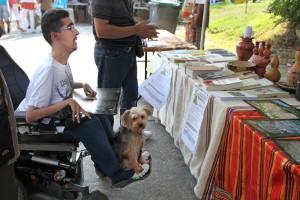
Personal budgets (PBs) are a well-established mechanism in social care and now emerging in health care across England. They are one vehicle to try to deliver better outcomes for people eligible to receive care services.
The idea is that people are best placed to know their own needs and how these can be met, so, by giving them a budget to plan for this, they can purchase the support they feel does this best. This may be from established services, in either the statutory, independent or third sectors, or from community groups, or directly from family or friends. The budget may be either managed by the person themselves (Direct Payment) or by a third party organisation on his/her behalf (Managed Personal Budget).
My fellow elf Martin Stevens recently noted in his excellent blog, the move to PBs has arguably been the biggest policy issue over the last decade and has certainly been the subject of much debate.
As you can no doubt see from this simple introduction, the policy of PBs has some simple and potentially powerful ideas at the core, but quickly becomes complex in its operations. This report from Waters and Hatton, seeks to add to our knowledge about how best to organise this complexity to meet individual needs and improve outcomes.

PB policy has some simple and potentially powerful ideas at the core, but quickly becomes complex in its operations.
Methods
So what did the authors of the report do? They describe their work as developing ‘practice-based evidence’ rather than being a large-scale research project.
This, they claim, means they have sought to pool data from front-line practice to undertake analyses, rather than establishing a separate research project to collect additional data. I find the distinction here a little too artificial, but I take something of the point the authors make and at least they have been transparent about what they have done and its limitations and acknowledge the need for focused, rigorous research as well if we are to develop the required detailed evidence base for PBs.
Local Authorities used the Personal Outcomes Evaluation Tool (POET) to collect data from people receiving PBs to ask about the process of obtaining a PB and its effects on their lives. The authors then aggregated the data from across 26 councils and 20 NHS organisations.
It represents the reports of around 4,000 people – 2,679 personal budget holders and 1,328 carers of people in receipt of a personal budget. This is a large data set. It does, though, leave us with a question as to how representative the sample is of people using PBs and of those eligible for statutory social care, as the authors note.

Those using their budget on community and leisure activities were more likely to report benefits in terms of some outcome indicators.
Key findings
There are many detailed findings in this report, including descriptive statistics about characteristics of respondents, their needs and self-rated health, their personal budgets and their experiences of obtaining this budget. These deserve careful reading, consideration and, ultimately placing in to the local context to reflect on how personal budgets are operating in each Local Authority.
For example, nearly 58% of respondents to the POETS survey were female and 92% were white. Are these figures representative characteristics of a) all users of social care services, b) people who actually receive personal budgets, c) people who might want a personal budget, or d) these populations in any specific local authority?
Some of the headline findings the authors report are:
- At least two thirds of respondents said their personal budget had made things better or a lot better in 11 of the 15 areas of life they asked about (e.g. independence, quality of life, feeling safe, and family relationships);
- Most respondents to the survey said they felt their views had been included during the setting of their personal budget, though the percentage stating this decreases slight from the assessment stage of the process (82%), through the planning (77%) to actually setting their budget (65%);
- There were significant areas of the budget process that in each aspect around 20-25% reported they had found it to be difficult, for example, making changes to support, information and advice, and understanding restrictions placed on the use of the budget;
- People who felt their views were fully included in the assessment of their needs were more likely to report positive impacts of their budget on outcomes indicators the survey asked about;
- People who had found the budget process to be user-friendly were more likely to report positive outcomes;
- People using their budgets on care and support services were less likely to report benefits in terms of certain outcomes, whilst those using their budget on community and leisure activities were more likely to report benefits in terms of some outcome indicators.
There are many more detailed findings in the report, however, these selected headlines show the value an individual local authority might gain by reflecting on the findings, and the care that would have to be taken in doing this. For example, insights in to the process of personal budget setting, how user friendly it is, and the potential impact of this on outcomes should lead local authorities to reflect on whether and how they might improve their process.
Reflecting on what people use their budget on is also helpful, but more detail would be needed before drawing many conclusions about whether or not people ought to be steered to certain kinds of support as, for example, it might be that people using care and support services had very different characteristics and/or needs than those using leisure services.

The challenges for Local Authorities, NHS organisations and individual practitioners are keeping up to date with this developing knowledge.
Discussion
This paper presents a lot of detail drawn from the POETS survey of personal budget users. There are methodological questions to be raised about the work, such as how representative the sample responding to the survey is, and how well tested the survey questionnaire is. The authors, though, are very fair in raising such issues and the caveats they place around the findings. They are also very clear in stating that associations they find between findings do not necessarily mean that the variable cause each other.
Personal budgets are a complex area and, as such, we need to draw together a range of knowledge on their use. Some of this will be experiences of local practice, some the results of aggregating data such as in this POETS survey.
Other information will be very focused on specific questions, and needs to be further robust research, such as that being provided by the National Institute of Health Research School for Social Care Research, whose portfolio of research includes several projects looking in depth at explicit aspects of how personal budgets are working, including with carers, with younger adults, with older people and at the interface with adult safeguarding.
The challenges for Local Authorities, NHS organisations and individual practitioners are keeping up to date with this developing knowledge and then being able to reflect and act on it in terms of local and individual practice development. It is only to be hoped that everyone has the information, time and inclination to develop such reflective, quality improvement oriented practice.
Link
John Waters, In Control and Chris Hatton, Centre for Disability Research at Lancaster University (2014) Third National Personal Budget Survey: Experiences of personal budget holders and carers across adult social care and health. London: Think Local Act Personal [Full Text]

Excellent new blog post by @Intipton Adult social care personal budgets: the complexity of control http://t.co/M8A8vjL3ct
RT @SocialCareElf: Adult social care personal budgets: the complexity of control http://t.co/FP7BPmdmpJ We wish more were given real choice
Review from @SocialCareElf of @chrishattoncedr& @incontrolorg ‘s
2014 Report on Personal Budgets in Social Care
http://t.co/rwsCXaRYv1
Adult social care personal budgets: the complexity of control http://t.co/bdWUTgH8hg via @sharethis
New out today from @SocialCareElf: Adult social care personal budgets by @Intipton: http://t.co/DFo0Hfk7CI
RT @SocialCareElf “Adult social care personal budgets: the complexity of control ” http://t.co/C7b1Mbx88a
“@SocialCareElf: Adult social care personal budgets: the complexity of control http://t.co/rgAxEOZntO” <Very fair review I think.
@chrishattoncedr @SocialCareElf thank you Chris. I’m pleased you thought it fair.
Adult #socialcare personal budgets: the complexity of control http://t.co/hhlDEvBWg8 via @sharethis
Story at bedtime? Blog at hometime: @Intipton examines the 2014 POET survey of #personalbudget users http://t.co/KcEWzlrYPn
This past year I have been navigating the system on behalf of my mother. Fortunately I am moderately IT savvy, don’t mind on-line forms and have some knowledge of the system: so we just about managed. But the complexity would have overwhelmed and undermined my mother at a time when she was hugely vulnerable. Easily accessible specialists who can help users navigate the system are desperately needed. Every GP practice should have a person available to do this : maybe a “support clinic” a week. And please don’t suggest the library or a “hub”: we have to visit the GP as a gateway to anything so other trips in our rural area are out of the question. Sorry. Rant over. Great research. Thank you.
Most recipients think personal budgets make life better. Fascinating research summary @SocialCareElf http://t.co/pNFOx2UepY
[…] to allow people to decide themselves what they want to buy, and something I have written about on here […]